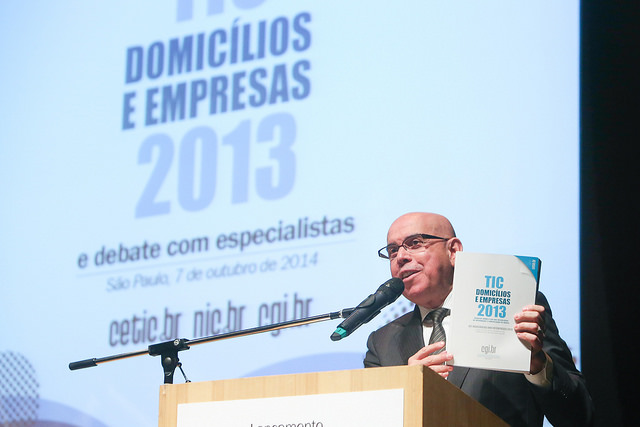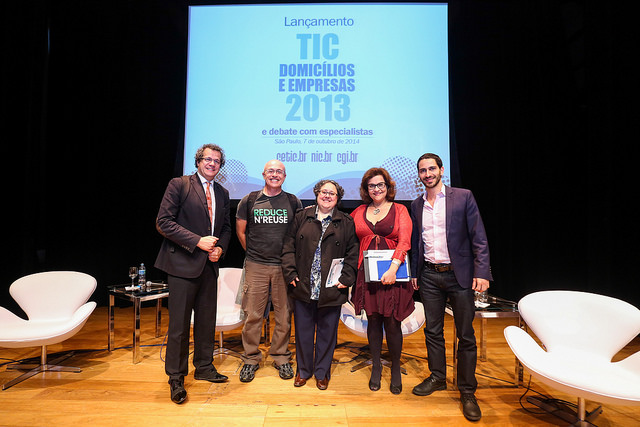Launch of the TIC Households and Enterprises 2013 publication features technology and Internet experts
On the evening of last Tuesday (7th), the launch of the TIC Households and Enterprises 2013 publication brought together 170 researchers, government representatives, specialists, and students in the field of Information and Communication Technologies (ICT) at the Brazilian British Center for the release of the book on the TIC Households and Enterprises 2013 surveys.
The opening of the event was led by the president director of the Brazilian Network Information Center (NIC.br), Demi Getschko, who mentioned 2014 as a significant year for the Internet in Brazil. Demi cited some events, including the approval of the Marco Civil da Internet and the realization of NETmundial.
The second speech was delivered by the manager of the Regional Center for Studies on the Development of the Information Society (CETIC.br), Alexandre Barbosa, who stressed that this is the ninth edition of the TIC Households and Enterprises survey, allowing for a historical analysis of the data and positioning Brazil on a growth trajectory year after year regarding the indicators on the presence of ICT in companies and households. "Providing society with reliable and up-to-date data on the socioeconomic impacts of ICT is a way to contribute to the construction of more effective and efficient public policies, as well as the development of the Internet in Brazil," affirms Alexandre.

In his presentation, the manager of CETIC.br highlighted some key points from the indicators of the TIC Households and Enterprises surveys, including the persistence of regional and social inequalities concerning Internet access and usage in Brazil. Despite this, today, 85% of the Brazilian population uses cell phones, equivalent to 143 million people, confirming the growth of Internet access via mobile devices. The numbers also reveal that the use of ICT by Brazilian companies is widespread, regardless of geographical region, size, or economic activity sector - 96% of companies have internet access.
According to Francisco Saboya, “looking at the numbers from the CETIC.br surveys, it is clear that our challenge is still access to computers and infrastructure. This should have been resolved a long time ago. It is extremely concerning that in 2014, half of Brazilian households do not have a computer, while the world is living in an era seeking information through the Internet.” Another point Saboya raised was the stabilization in the number of users engaging in e-commerce over the past three years. “In previous years, we experienced an upward trend, and now that number has stabilized. The internet-using population is not advancing in an aspect that is extremely important, particularly within the perspective of the Internet of Things emerging.”
Silvio Meira emphasized during the debate the importance of CETIC.br's surveys so that in the future, we can contextualize and tell the story of what the Brazilian Internet once was. "I often say we are in the fifth digital revolution. We have had five milestones in recent decades: hardware, software, network, mobile, and the Internet of Things. We are experiencing a large-scale digital transformation, opening new entrepreneurial perspectives," he comments.
According to Graciela Selaimen, besides inequality from the perspective of technology appropriation and access, another level of inequality that concerns is a new elite forming, those people who develop technologies and not just users. "The existence of technologies without understanding the intentionality embedded in their codes means our access to goods and services will increasingly be determined by usage. Meanwhile, uninformed use may lead to a scenario of further exclusion and social selection," asserts Selaimen. "Another important aspect is content production. The formation of content developers should be considered in public digital inclusion policies, as Brazilians access online content."
In his remarks, Ronaldo Lemos reminded that CETIC.br generated the first statistics on the growth of internet cafes in Brazil in 2007. “Numbers on connectivity in Brazil are rare, and therefore it is difficult to make governmental decisions and promote public policies. Thanks to CETIC.br's figures, it was possible to generate activism for the formalization of internet cafes, allowing them to thrive,” he said. Ronaldo Lemos also mentioned that development rarely accommodates stages. "Multiple problems need to be solved simultaneously, and among all methodologies to combat inequality, democratizing skills is the most effective."
The debate brought to light different perspectives and encouraged reflection on the implications of ICT adoption in Brazil, especially in the context of an increasingly network-connected society. Watch the debate video and visit our YouTube channel of NIC.br.
The PDF version of the TIC Households and Enterprises 2013 publication is now available on the CETIC.br website. The indicators from the surveys were published this May and June, respectively, and can be viewed at https://www.cetic.br/pesquisas.
_
The TIC Households and Enterprises 2013 is a publication of the Brazilian Internet Steering Committee (CGI.br), conducted by the Regional Center for Studies on the Development of the Information Society (CETIC.br), a department of the Brazilian Network Information Center (NIC.br).
This content was automatically translated with the support of artificial intelligence.


